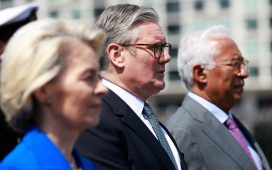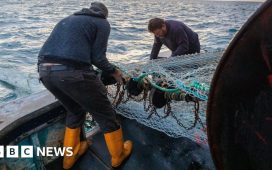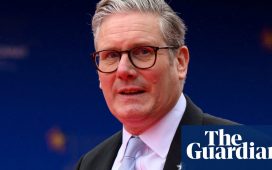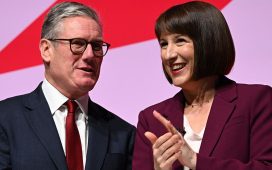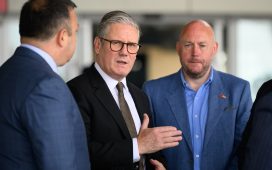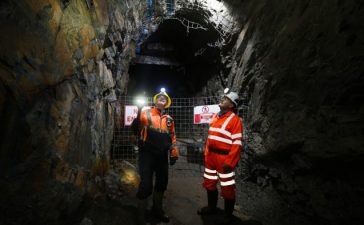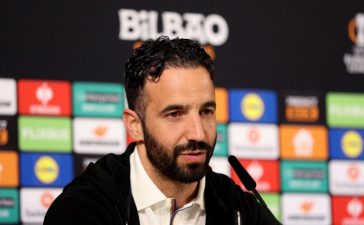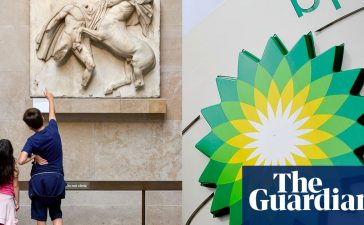The bumper revenues of oil-producing states should be subject to a $25bn levy to help pay for the impact of climate disasters on the world’s poorest and most vulnerable people, a group of former world leaders and leading economists has said.
Seventy international figures led by the former UK prime minister Gordon Brown signed a letter calling for the measure before a crucial UN climate summit, Cop28, that begins in Dubai on Thursday. The signatories include 25 former prime ministers or presidents.
Such a levy would shave off only a small fraction of the bonanza that oil-producing countries have made in recent years, and would help to fill a fund for the “loss and damage” to poor countries afflicted by the impacts of the climate crisis.
Brown told the Guardian: “The deadlock on climate finance has to be broken if Cop28 is to succeed. After more than a decade of broken promises, a $25bn oil and gas levy paid by the petrol states and proposed by the UAE as chair of Cop would kickstart finance for mitigation [reduction of greenhouse gas emissions] and adaptation in the global south.
“But all the main historic and current emitters must come to the table with guarantees and grants if the $1tn a year needed for development and climate funding in the global south is to be raised.”
The letter is being sent to the Cop28 president-designate, Sultan Al Jaber, who is also chief executive of Adnoc, the national oil company of the United Arab Emirates, and to the current G20 president, President Luiz Inácio Lula da Silva of Brazil.
Signatories include the former UN secretary-general Ban Ki-moon; the former New Zealand prime minister Helen Clark; the former president of Malawi Joyce Banda, and the former president of Chile Michelle Bachelet, as well as scores of leading economists.
The letter points out that, according to the International Energy Agency, petroleum revenues were $1.5tn a year pre-Covid but soared to a record $4tn in 2022. This is 20 times the entire global aid budget, more than 30 times the budgets of all multilateral development banks combined, and 40 times the $100bn a year promised in 2009 for poor countries to help cut their greenhouse gas emissions and adapt to the impacts of the climate crisis.
The authors write: “In the space of just a year, $2.5tn of windfall profits were gained by the oil producer states and their national and other private companies that they have done nothing to earn.”
Filling the loss and damage fund is one of the key tasks at Cop28, as few countries have yet stepped up. Hundreds of billions will be needed, which most developing countries acknowledge is likely to be beyond the reach of governments alone, so sources of revenue being explored include potential levies on frequent flyers and on international shipping.
The Guardian understands that the UAE is considering a contribution to the loss and damage fund but this is not in response to calls for a levy.
The levy on fossil fuel-producing countries proposed in Brown’s letter would represent about 3% of the oil and gas revenues of the world’s biggest petrostates, and the signatories wrote that the loss and damage fund should not be the only beneficiary, as other programmes could also be targeted.
after newsletter promotion
The signatories wrote: “Some of the private companies in the sector have already paid extra taxes on their windfall profits, but the private oil majors represent just 15% of the revenues. The biggest beneficiaries by far have been the major petrostates amassing $973bn in export earnings alone, up by $381bn on the year before.
“The UAE alone has seen their export earnings rise from $63bn to $98bn, with Qatar’s export earnings rising from $53bn to $86bn and Kuwait up from $63bn to $88bn. Norway’s export earnings rose from $87bn to $174bn with Saudi Arabia, up from $190bn to $311bn.
“A levy of $25bn – which represents just over 1% of last year’s oil and gas windfall revenues and just 3% of the major exporters’ earnings – could kickstart a programme of investment in the global south.”
World leaders including King Charles III; the UK prime minister, Rishi Sunak; the UN secretary-general, António Guterres, and Pope Francis are expected at Cop28 this week. The leaders will join for the first days of the summit, then ministers and high-level officials from 198 countries will carry on the fortnight-long negotiations.

